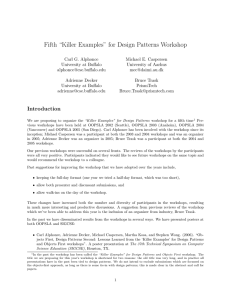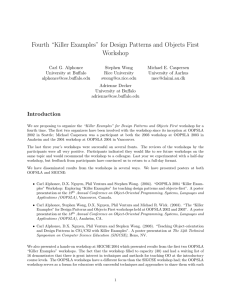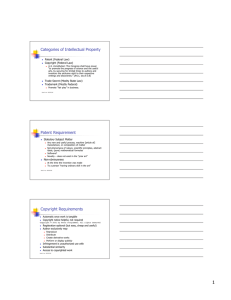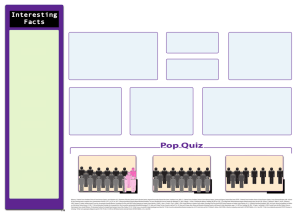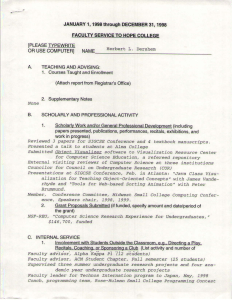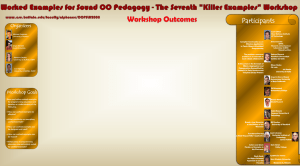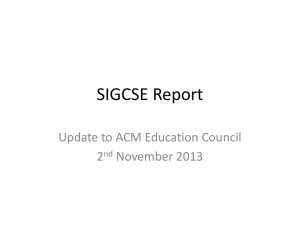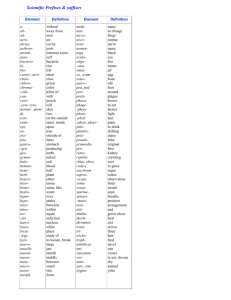Process in oo Pedagogy A “killer” workshop Carl Alphonce J¨urgen B¨orstler
advertisement
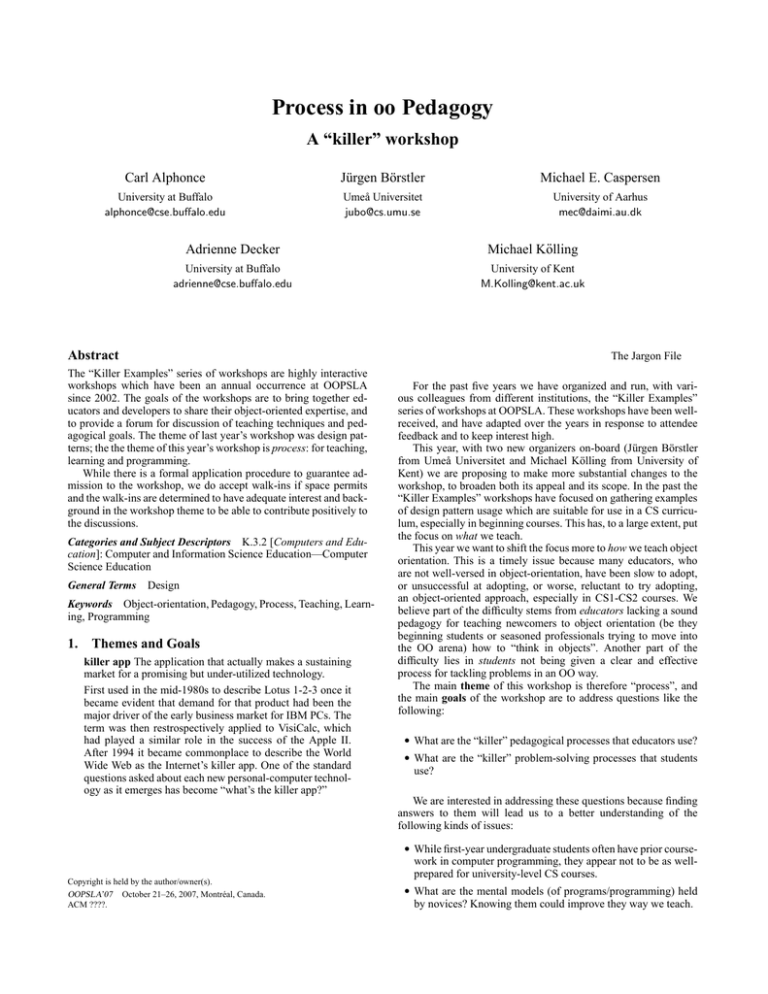
Process in oo Pedagogy A “killer” workshop Carl Alphonce Jürgen Börstler Michael E. Caspersen University at Buffalo alphonce@cse.buffalo.edu Umeå Universitet jubo@cs.umu.se University of Aarhus mec@daimi.au.dk Adrienne Decker Michael Kölling University at Buffalo adrienne@cse.buffalo.edu University of Kent M.Kolling@kent.ac.uk Abstract The Jargon File The “Killer Examples” series of workshops are highly interactive workshops which have been an annual occurrence at OOPSLA since 2002. The goals of the workshops are to bring together educators and developers to share their object-oriented expertise, and to provide a forum for discussion of teaching techniques and pedagogical goals. The theme of last year’s workshop was design patterns; the the theme of this year’s workshop is process: for teaching, learning and programming. While there is a formal application procedure to guarantee admission to the workshop, we do accept walk-ins if space permits and the walk-ins are determined to have adequate interest and background in the workshop theme to be able to contribute positively to the discussions. Categories and Subject Descriptors K.3.2 [Computers and Education]: Computer and Information Science Education—Computer Science Education General Terms Design Keywords Object-orientation, Pedagogy, Process, Teaching, Learning, Programming 1. Themes and Goals killer app The application that actually makes a sustaining market for a promising but under-utilized technology. First used in the mid-1980s to describe Lotus 1-2-3 once it became evident that demand for that product had been the major driver of the early business market for IBM PCs. The term was then restrospectively applied to VisiCalc, which had played a similar role in the success of the Apple II. After 1994 it became commonplace to describe the World Wide Web as the Internet’s killer app. One of the standard questions asked about each new personal-computer technology as it emerges has become “what’s the killer app?” For the past five years we have organized and run, with various colleagues from different institutions, the “Killer Examples” series of workshops at OOPSLA. These workshops have been wellreceived, and have adapted over the years in response to attendee feedback and to keep interest high. This year, with two new organizers on-board (Jürgen Börstler from Umeå Universitet and Michael Kölling from University of Kent) we are proposing to make more substantial changes to the workshop, to broaden both its appeal and its scope. In the past the “Killer Examples” workshops have focused on gathering examples of design pattern usage which are suitable for use in a CS curriculum, especially in beginning courses. This has, to a large extent, put the focus on what we teach. This year we want to shift the focus more to how we teach object orientation. This is a timely issue because many educators, who are not well-versed in object-orientation, have been slow to adopt, or unsuccessful at adopting, or worse, reluctant to try adopting, an object-oriented approach, especially in CS1-CS2 courses. We believe part of the difficulty stems from educators lacking a sound pedagogy for teaching newcomers to object orientation (be they beginning students or seasoned professionals trying to move into the OO arena) how to “think in objects”. Another part of the difficulty lies in students not being given a clear and effective process for tackling problems in an OO way. The main theme of this workshop is therefore “process”, and the main goals of the workshop are to address questions like the following: • What are the “killer” pedagogical processes that educators use? • What are the “killer” problem-solving processes that students use? We are interested in addressing these questions because finding answers to them will lead us to a better understanding of the following kinds of issues: • While first-year undergraduate students often have prior course- Copyright is held by the author/owner(s). OOPSLA’07 October 21–26, 2007, Montréal, Canada. ACM ????. work in computer programming, they appear not to be as wellprepared for university-level CS courses. • What are the mental models (of programs/programming) held by novices? Knowing them could improve they way we teach. • What is the role of early design/modelling in an objects-first • Carl Alphonce, D.X. Nguyen, Phil Ventura and Stephen Wong. curriculum? How does the teaching process and the students’ programming process address design/modeling? (2003). “Teaching Object-orientation and Design Patterns in CS1/CS2 with Killer Examples”. A poster presentation at The 34th Technical Symposium on Computer Science Education (SIGCSE), Reno, NV. • What are needs of industry - what will keep students competi- tive in the workplace? www.sigcse.org/conferences/FinalProgram03.pdf (pg. 35) If accepted, this will be our sixth workshop at OOPSLA. Previous workshops have been held at OOPSLA 2002 through OOPSLA 2006. Carl Alphonce has been involved with the workshop since its inception; Michael Caspersen was a participant at both the 2003 and 2004 workshops and was an organizer in both 2005 and 2006; Adrienne Decker was an organizer in both 2005 and 2006; J ürgen Börstler is a new organizer this year, who has organized the very successful Workshop on Pedagogies and Tools for the Teaching and Learning of Object Oriented Concepts workshop series, which has been held OOPSLA 1997, ECOOP 1998, OOPSLA 1999, ECOOP 2000, OOPSLA 2001 and ECOOP 2002 through ECOOP 2007; Michael Kölling is also a new organizer this year, who has organized several BlueJ workshops, and served on the program committee of OOPSLA 2005. Our previous workshops were successful on several fronts. The reviews of the workshops by the participants were all very positive. Participants indicated they would like to see future workshops on the same topic and would recommend the workshop to a colleague. In the past we have disseminated results from the workshops in several ways. We have presented posters at both OOPSLA and SIGCSE: • Carl Alphonce, Michael E. Caspersen, Adrienne Decker and Bruce Trask. (2006). “Results of the Fifth ‘Killer Examples’ for Design Patterns Workshop”. A poster presentation at the 21st Annual Conference on Object-Oriented Programming, Systems, Languages and Applications (OOPSLA). doi.acm.org/10.1145/1176617.1176648 • Carl Alphonce, Adrienne Decker, Michael Caspersen, Martha Kosa, and Stephen Wong. (2006). “Objects First, Design Patterns Second: Lessons Learned from the ‘Killer Examples’ for Design Patterns and Objects First workshops”. A poster presentation at The 37th Technical Symposium on Computer Science Education (SIGCSE), Houston, TX. www.cs.rit.edu/~sigcse06/posters1.shtml • Carl Alphonce, Stephen Wong, Michael Caspersen and Adri- enne Decker. (2005). “The Fourth “Killer Examples” For Design Patterns and Objects First Workshop”. A poster presentation at the 20th Annual Conference on Object-Oriented Programming, Systems, Languages and Applications (OOPSLA), San Diego. www.oopsla.org/2005/ShowEvent.do?id=565 • Carl Alphonce, D.X. Nguyen, Phil Ventura and Stephen Wong. (2004). “OOPSLA 2004 “Killer Examples” Workshop: Exploring “Killer Examples” for teaching design patterns and objectsfirst”. A poster presentation at the 19th Annual Conference on Object-Oriented Programming, Systems, Languages and Applications (OOPSLA), Vancouver, Canada. www.oopsla.org/2004/ShowEvent.do?id=564 • Carl Alphonce, Stephen Wong, D.X. Nguyen, Phil Ventura and Michael R. Wick. (2003). “The “Killer Examples” for Design Patterns and Objects First workshops held at OOPSLA 2002 and 2003”. A poster presentation at the 18th Annual Conference on Object-Oriented Programming, Systems, Languages and Applications (OOPSLA), Anaheim, CA. www.oopsla.org/oopsla2004/files/pos.html We also presented a hands-on workshop at SIGCSE 2004 which presented results from the first two OOPSLA “Killer Examples” workshops. The fact that the workshop filled to capacity (30) and had a waiting list of 16 demonstrates that there is great interest in techniques and methods for teaching OO at the introductory course levels. The OOPSLA workshops have a different focus than the SIGCSE workshop had; the OOPSLA workshop serves as a forum for educators with successful techniques and approaches to share them with each other. The SIGCSE workshop sought to disemminate the results of the OOPSLA workshop more widely, to educators who are seeking effective means to teach this material. • Carl Alphonce, Dung X. Nguyen, Phil Ventura, Michael R. Wick and Stephen Wong. (2004). “Teaching Design Patterns in CS1/CS2”. A workshop at the 35th Technical Symposium on Computer Science Education (SIGCSE). www.sigcse.org/conferences/FinalProgram04.pdf (pg. 25) We also presented a paper at SIGCSE 2007 with highlights from the first five years of the “Killer Examples” workshop series: • Carl Alphonce, Michael Caspersen and Adrienne Decker. (2007). “Killer “Killer Examples” for Design Patterns”. In the proceedings of the 38th Technical Symposium on Computer Science Education (SIGCSE). doi.acm.org/10.1145/1227504.1227390 While we have presented results from the workshops at SIGCSE, and participants at SIGCSE are aware of the workshops, we have found that we draw participants to the workshop mostly from the traditional OOPSLA Educators’ symposium crowd. We hope to attract more people to the workshop by broadening the focus away from just design patterns, which may be perceived as too advanced for those just thinking of adopting OO in their courses. We also hope that the East-coast location of OOPSLA will draw more participants from to OOPSLA from the East-coast crowd, which includes many SIGCSE participants, and also participants from Europe. Workshop Organizers • Carl Alphonce, Research and Teaching Assistant Professor, University at Buffalo. e-mail: alphonce@cse.buffalo.edu • Michael E. Caspersen, Director, IT-Vest, University of Aarhus. e-mail: mec@daimi.au.dk • Adrienne Decker, Lecturer, University at Buffalo. e-mail: adrienne@cse.buffalo.edu • Jürgen Börstler, Associate Professor, Umeå Universitet. e-mail: jubo@cs.umu.se • Michael Kölling, Senior Lecturer, University of Kent e-mail: M.Kolling@kent.ac.uk Primary Contact and Chair Carl Alphonce 201 Bell Hall Department of Computer Science & Engineering University at Buffalo, SUNY Buffalo, NY 14260-2000 e-mail: alphonce@cse.buffalo.edu phone: (716) 645-3180 x115 fax: (716) 645-3464 Organizer Backgrounds and Roles Carl Alphonce is Research Assistant Professor and Teaching Assistant Professor at the University at Buffalo, State University of New York. He earned a Ph.D. from the University of British Columbia in 2000. He has taught an object-oriented introduction to computer science for 9 years. He has organized and been chair of all of the “Killer Examples” workshops, from OOPSLA 2002 through 2006. He organized and was chair of the “Teaching Design Patterns in CS1/CS2” workshop at SIGCSE 2004. He organized and was chair of a special session entitled “Teaching using off-the shelf on-line materials” at SIGCSE 2001. He was co-organizer of a session at the 2002 International Conference on Engineering Education. Selected publications: Carl Alphonce, Michael Caspersen and Adrienne Decker. (2007). “Killer “Killer Examples” for Design Patterns”. In the proceedings of the 38th Technical Symposium on Computer Science Education (SIGCSE). doi.acm.org/10.1145/1227504.1227390 Carl Alphonce and Blake Martin. (2005). “Green: a pedagogically customizable round-tripping UML class diagram Eclipse plug-in”. In the proceedings of The Eclipse Technology Exchange, a workshop at the 20th Annual Conference on ObjectOriented Programming, Systems, Languages and Applications. doi.acm.org/10.1145/1117696.1117720 C. Alphonce and P. Ventura. “Using graphics to support the teaching of fundamental object-orientation principles in CS1,” 2003. Proceedings companion of the 18th Annual Conference on Object-Oriented Programming, Systems, Languages and Applications, ACM Press. doi.acm.org/10.1145/949344.949391 C. Alphonce and P. Ventura, “Object-orientation in CS1-CS2 by design,” 2002. SIGCSE Bulletin 34:3, 70-74. doi.acm.org/10.1145/544414.544437 P. Ventura and C. Alphonce, “Teaching OOD and OOP through Java and UML in CS1 and CS2”. Position paper presented at the Fifth Workshop on Pedagogies and Tools for Assimilating Object Oriented Concepts, October 2001. www.cs.umu.se/~jubo/Meetings/OOPSLA01/ Contributions/PVentura.html Workshop role His roles in the workshop include chair and primary contact. As chair he is primarily responsible for the organization of the workshop, putting out the call for submissions and participation, coordinating the submission reviewing process, maintenance of the listserv for pre- and post-workshop activities, maintenance of the workshop web site, scheduling the workshop activities, and introducing and running the workshop. He will also contribute to the creation of a poster reporting on the results of the workshop. Michael E. Caspersen is an Academic Researcher and Director of IT University West at University of Aarhus, Denmark. He has a B.Sc. in computer science and mathematics from University of Aarhus (1984) and a M.Sc. in computer science from University of Aarhus (1987). He has taught (introductory) programming for over 20 years and (introductory) object-oriented programming for over 15 years. He organized and was chair of ITiCSE 2002 conference in Aarhus, and he has been on the program committee of ITiCSE 2000, ITiCSE 2001, and the 2nd, 3rd, 4th, 5th and 6th Annual Finnish/Baltic Sea Conference on Computer Science Education (2002-06). Together with Michael Kölling he organized and held a full-day workshop entitled “Teaching Introductory Object-Oriented Programming – Dangers, Traps, and a Road Map” at SIGCSE 2001, and a similar tutorial at ITiCSE 2001. Together with Jens Bennedsen he organized and held a workshop entitled “Model-Driven Programming Education” at SIGCSE 2005. He was a participant of two previous “Killer Examples” workshops, at OOPSLA 2003 and 2004, and coorganizer of the workshop at OOPSLA 2005. He has published more than a dozen papers on computer science education, including papers on how to teach frameworks and design patterns early in the curriculum. He is also author of a two-volume textbook on programming (in Danish, 1993). He is a founding member of the Scandinavian Pedagogy of Programming Network (SPoP) established in fall 2004, and coeditor of Scandinavian Pedagogy of Programming, to appear. Selected publications: Carl Alphonce, Michael Caspersen and Adrienne Decker. (2007). “Killer “Killer Examples” for Design Patterns”. In the proceedings of the 38th Technical Symposium on Computer Science Education (SIGCSE). doi.acm.org/10.1145/1227504.1227390 Caspersen, M.E., Christensen, H.B. “The Need for Killer Examples for Object-Oriented Frameworks”. In: Proceedings of the 18th Annual ACM SIGPLAN Conference on ObjectOriented Programming, Systems, Languages, and Applications, OOPSLA 2003, Anaheim, California, USA, 26-30 October 2003. Caspersen, M.E., Christensen, H.B. “Frameworks in CS1 – a Different Way of Introducing Event-driven Programming”. In: Proceedings of the seventh Annual Conference on Innovation and Technology in Computer Science Education, ITiCSE 2002, Aarhus, Denmark, 24-26 June 2002. Caspersen, M.E.. “A C++ Framework for Active Objects in Embedded Real-Time Systems – bridging the gap between modeling and implementation.” In: Technology of Object-Oriented Languages and Systems, TOOLS 32, Melbourne, Australia, pp. 52-65. IEEE Computer Society, 1999. ISBN 0-7695-0462-0. Workshop role His roles in the workshop include reviewer and moderator. As reviewer he is responsible for reviewing submissions for possible acceptance. As moderator he is responsible for facilitating discussion on the listserv during pre-workshop activities as well as during the workshop itself. He will also contribute to the creation of a poster reporting on the results of the workshop. Adrienne Decker is a Lecturer at the University at Buffalo, State University of New York. She holds a Master’s Degree in Computer Science and Engineering from the University at Buffalo, and is currently working on the completion of her Ph.D., which is focused on assessment issues in introductory computer science courses. She has taught an object-oriented introduction to computer science at UB since 2001 and has been involved with the continued improvement of the curriculum in those courses as well as the creation of assignments that blend the introductory material with key object-oriented concepts and especially with the use of design patterns. She was a co-organizer of the 2005 and 2006 “Killer Examples” workshop. Selected publications: Carl Alphonce, Michael Caspersen and Adrienne Decker. (2007). “Killer “Killer Examples” for Design Patterns”. In the proceedings of the 38th Technical Symposium on Computer Science Education (SIGCSE). doi.acm.org/10.1145/1227504.1227390 Decker A., Ventura, P., Egert, C. (2006) “Through the looking glass: Reflections on using undergraduate teaching assistants in CS1”, 37th Annual SIGCSE Technical Symposium on Computer Science Education, Houston, TX, pp. 46–51. Decker, A., Haydanek, S., and Egert, C. (2005) “When objects collide: Abstractions over common physics problems for capstone projects in CS1”, The Journal of Computing Sciences in Colleges, Vol 21 Issue 2, pp. 12–18. Ventura, P., Egert, C., and Decker, A. (2004) “Ancestor Worship in CS1: Reexamining the Introduction of Arrays”, 2004 OOPSLA Educator’s Symposium, Vancouver, BC, pp. 68–72. Decker, A. (2003) “A Tale of Two Paradigms”, The Journal of Computer Sciences in Colleges, Vol 19 Issue 2, pp. 238–246. Workshop role Her roles in the workshop include reviewer and moderator. As reviewer she is responsible for reviewing submissions for possible acceptance. As moderator she is responsible for facilitating discussion on the listserv during pre-workshop activities as well as during the workshop itself. She will also contribute to the creation of a poster reporting on the results of the workshop. Jürgen Börstler is is an associate professor and director of studies in computing science at Umeå University, Umeå, Sweden. His main research interests are in the areas object-oriented software development, requirements management, process improvement, and educational issues in computer science. He has taught object-oriented programming and design for about 15 years. He is a founding member of the Scandinavian Pedagogy of Programming Network (SPoP) established in fall 2004. He is the co-founder of the Workshop on Pedagogies and Tools for the Teaching and Learning of Object Oriented Concepts series and served as a co-organiser for all workshops in this series. He is giving an invited talk at INFOS2007, the 12th Conference on Computer Science Education of the German Society for Computer Science. Selected publications: J. Börstler, M. Nordström, L. Kallin Westin, J.-E. Moström, J. Eliasson. (to appear in 2007). “Transitioning to OOP–A Never Ending Story”, Scandinavian Pedagogy of Programming, M. Kölling, J. Bennedsen, M.E. Caspersen (Editors), Springer. Jürgen Börstler. (To appear in 2007). Foreword to the Special Section on the ECOOP’06 Workshop on Pedagogies and Tools for the Teaching and Learning of Object-Oriented Concepts, Informatics in Education 6 (1). Jürgen Börstler. (To appear in 2007). “Tenth Workshop on Pedagogies and Tools for the Teaching and Learning of ObjectOriented Concepts, ECOOP 2006 Workshop Reader”, Lecture Notes in Computer Science, LNCS 4379, Springer, 147-157. J. Börstler (editor). (2006). “Proceedings of the Sixth Conference on Software Engineering Research and Practice in Sweden”, Ume a˚, Sweden, Oct 18-19, 2006, Department of Computing Science, Ume˚ a University, Oct 2006, ISBN 91-7264-198-3. Jürgen Börstler, H˚ akan Gulliksson, Lena Palmquist (editors). (2006). “Proceedings of Ume a˚’s Ninth Student Conference in Computing Science”, Technical Report UMINF-06.24, Department of Computing Science, Ume˚ a University, Sweden. G. Wikstrand, J. Börstler. (2006). “An Analysis of Success Factors for a Team-Project Software Development Course”, Proceedings of the 19th Conference on Software Engineering Education and Training, Hawaii, USA. Jürgen Börstler, Carsten Schulte. (2005). “Teaching Object Oriented Modelling with CRC Cards and Roleplaying Games”, Proceedings WCCE 2005, Cape Town, South Africa. Workshop role His roles in the workshop include reviewer and moderator. As reviewer he is responsible for reviewing submissions for possible acceptance. As moderator he is responsible for facilitating discussion on the listserv during pre-workshop activities as well as during the workshop itself. He will also contribute to the creation of a poster reporting on the results of the workshop. Michael Kölling is a Senior Lecturer at the University of Kent. He received a PhD from the University of Sydney, and has been teaching introductory programming for 13 years. His work in software tools for programming learning and teaching has led to the development of the BlueJ and Greenfoot environments, which were designed to support initial learning of programming. Together with David Barnes, he is the author of an introductory programming textbook. Michael has organised several workshops about programming with BlueJ and Greenfoot, and was on the Programme Committee of OOPSLA 2005. Selected publications: Kölling, M. and Barnes, D. (2004) “Enhancing apprenticebased learning of Java”. In Proceedings of the thirty-fifth SIGCSE technical symposium on computer science education, 286-290. ACM. Michael Kölling and Poul Henriksen. (2005). “Game programming in introductory courses with direct state manipulation.” In ITiCSE 2005 Proceedings, pages 59-63. Owen Astrachan, Kim Bruce, Elliot Koffman, Michael Kölling, and Stuart Reges. (2005). “Resolved: Objects early has failed.” In SIGCSE’05 Proceedings, volume 37, page 451. Kölling, M and Rosenberg, J. (2001) “Guidelines for teaching object orientation with Java”. In ITiCSE 2001 Proceedings, pages 33-36. Workshop role His roles in the workshop include reviewer and moderator. As reviewer he is responsible for reviewing submissions for possible acceptance. As moderator he is responsible for facilitating discussion on the listserv during pre-workshop activities as well as during the workshop itself. He will also contribute to the creation of a poster reporting on the results of the workshop. Previous related workshops The most directly related prior workshops are the previous “Killer Examples” workshops. The proposed workshop follows the same pattern as the previous five, but is not focused solely on design patterns or even on what we teach, but rather on how we teach and how students learn. Another highly related workshop is the Workshop on Pedagogies and Tools for Assimilating Object Oriented Concepts. This recurring workshop has as its goal for to “share experiences about alternative teaching approaches and tools to improve the teaching and learning of the basic concepts of object technology rather than teaching a specific programming language.” (oopsla.acm.org/oopsla2001/fp/workshops/05.html) This workshop has in the past alternated between OOPSLA in North America and a conference in Europe, such as ECOOP. The last North American hosting of the workshop occurred in 2001, at the Tampa OOPSLA. We discussed with Jürgen Börstler, the main organizer of this workshop series, the possibility of holding a joint workshop at OOPSLA, to broaden the scope of our workshop and also to broaden the participation in the workshop. We are delighted that he agreed to join in the organization of this OOPSLA workshop. Finally, the OOPSLA Educators’ Symposium is also clearly related to this workshop, insofar as it also addresses issues of pedagogy in an object-oriented setting. However, the Educators’ Symposium is significantly broader in its scope, addressing a full spectrum of object-oriented issues throughout the curriculum. It is also much larger, typically drawing on the order of one hundred participants. Finally, the Educators’ Symposium is organized more as a mini-conference rather than as an intimate and hands-on workshop, which is what we’re proposing. This workshop will complement, rather than compete with, the Educators’ Symposium. Expected number of participants In the first two workshops we restricted participation to only those who submitted examples for presentation. Based on our experience with the SIGCSE workshop enrollment, as well as inquiries we have received regarding “observer status” at the previous OOPSLA workshops, we understand there is interest in participating without formally presenting. We therefore made the last three years’ workshop more accessible in two ways: • We encouraged submissions to participate as presenters and as discussants. A presenter submitted a short (3-5 page) paper describing their “Killer Example”, while a discussant submitted a statement of interest. Prior to the workshop everyone (presenters, discussants and organizers) communicated via a listserv mailing list, discussing drafts of the examples to be presented at the workshop. At the workshop presenters presented their examples and participated in the discussion of other examples, while discussants participated in the discussions only. • We also allowed walk-ins at the workshop, as long as there was capacity in the room (we reached the room capacity of about 20 - we had expected about 12 participants). We propose to structure this year’s workshop in the same fashion, with presenters and discussants, as well as walk-ins. The main distinction between a discussant and a walk-in is that discussants are guaranteed place in the workshop, and can participate in the pre-workshop activities. We expect 3 to 5 presenters, and 12 to 15 other participants. Including the organizers we expect the workshop to have between 20 and 25 total participants. The ideal number would be 4 example presenters, 12 discussants, and 5 organizers, for a total of 21 total participants. Workshop advertisement We will advertise the workshop on mailing lists such as the SIGCSE list, the AP-CS list, OOTINCSE, and various other mailing lists whose main audiences are likely to be interested in the workshop topic. The organizers will also post notices on their homepages to help advertise the workshop. Workshop preparation (pre-workshop activities) Prior to the workshop we expect participants to submit their contribution for posting on a web page. Presenters submit a short paper, while discussants submit a brief statement of interest. As with previous workshops, a listserv e-mail forum is set up to allow for pre-workshop discussion of submissions. As moderators of the pre-workshop activities the workshop organizers will ensure that the discussion on the listserv is active and constructive, by asking questions and generally engaging the workshop participants in dialog. This process generally results in constructive feedback which submitters can use to revise and improve their submissions prior to the workshop. The allows us to use our workshop time more effectively: since everyone has a good sense of the background issues, this permits workshop discussions to focus on more substantial issues. Workshop activities and format We are proposing a full-day workshop. The morning program will consist of a short introductory presentation by the organizers, followed by presentations by the presenters of their submissions. In the afternoon we break into smaller groups for more intense and focused discussions. Each group consists of a presenter(s), at least one a workshop organizer (who serves as a facilitator), and discussants. We mix and match the groups so that everyone gets a chance to discuss each example with its presenter(s). Here is a tentative schedule for events, modelled after last year’s schedule, assuming we have 4 accepted presentations: 8:30 Introduction 10 minutes 8:40 1st example 30 minute presentation, 10 minute question period 9:20 2nd example 30 minute presentation, 10 minute question period 10:00 Coffee break 30 minutes 10:30 3rd example 30 minute presentation, 10 minute question period 11:10 4th example 30 minute presentation, 10 minute question period 11:50 Morning wrap-up 10 minutes 12:00 Lunch 60 minutes 1:00 Small group discussions, round 1 40 minutes (groups I & II, groups III & IV) 1:40 Small group discussions, round 2 40 minutes (groups I & III, groups II & IV) 2:20 Small group discussions, round 3 40 minutes (groups I & IV, groups II & III) 3:00 Coffee break 30 minutes 3:30 Poster materials preparation 50 minutes 4:20 Poster materials presentation 30 minutes 4:50 Workshop wrap-up (summary of findings, reactions) 10 minutes This schedule assumes that the day starts at 8:30 AM and finishes at 5:00PM. If the day is longer we will distribute that time to presentation and discussions periods. The discussion periods will center around understanding what makes a particular process a “killer”, and how the it could be improved or adapted for use at different institutions. Post-workshop activities After the workshop participants will be expected to submit final versions of their submissions for inclusion on a web site for general dissemination. The web sites from previous years’ workshop are linked from : www.cse.buffalo.edu/faculty/alphonce/KillerExamples/ As noted, we have in the past presented posters of the workshop at the conference poster session, and are prepared to do so again. The workshop poster is halfway prepared ahead of time, with general information about the workshop and its presentations, but with open space for workshop outcomes, to be filled in after the workshop. The organizers will also endeavor to advertise the workshop activities by submitting to relevant related conferences; as noted we have in the past presented workshop results at both OOPSLA and SIGCSE; this year, with a large European contingent on the organizing committee of the workshop, we plan to submit posters at both OOPSLA 2007, SIGCSE 2008, ITiCSE 2008 and ECOOP 2008. We maintain, at the above-noted website, materials from previous years’ workshops which serve as a resource for educators seeking materials. We will encourage participants to post updates to their materials after the workshop is over and as they are using the examples in the classroom. Special requirements The workshop organizers and most participants will bring laptops. We will therefore require power for them (i.e. power strips are required for each table). A data projector has been available for each of the previous workshops, and has proven very beneficial. We would be most pleased if arrangements for data projectors could be made. Other items which we have made use of in the past include an overhead projector, easels with paper and markers, and whiteboards with dry-erase markers.
